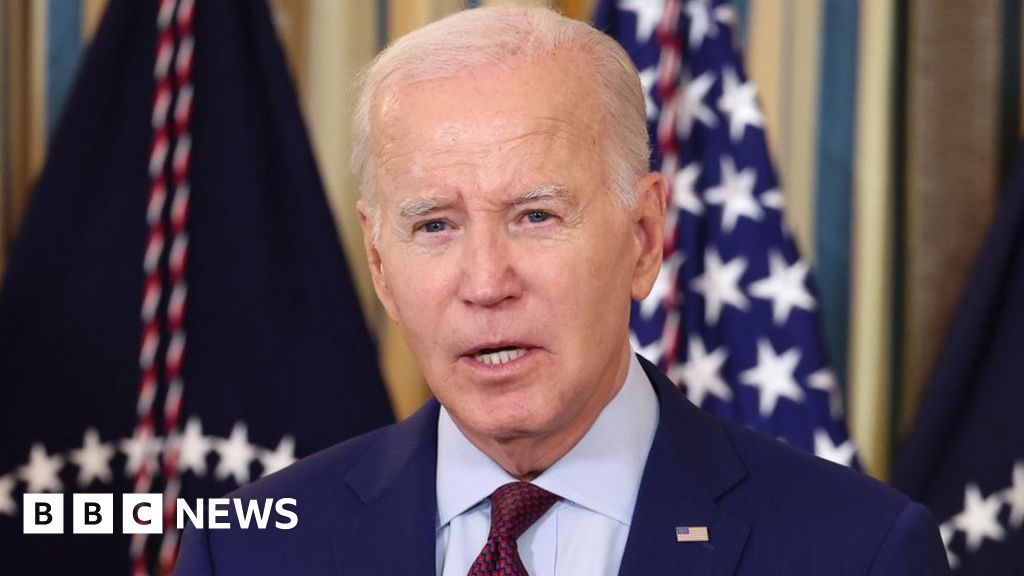Chipmaking giant Taiwan Semiconductor (TSMC) has delayed the start of production at its factory in the US state of Arizona, in a setback to President Biden's technology ambitions.

The firm says chip manufacturing will no longer start next year, due to a shortage of skilled workers. The White House has laid out plans to bring more chip production to the US.
It comes as an ongoing trade row centered on the technology intensifies between Washington and Beijing. TSMC's shares closed more than 3% lower in Taiwan on Friday. On Thursday, TSMC Chairman Mark Liu said production of advanced microprocessors at its Arizona factory in the south west of the US would now begin in 2025.
During an earnings presentation, Mr Liu said the plant, which has been under construction since April 2021, faced a shortage of workers with the "specialised expertise required for equipment installation in a semiconductor-grade facility." He added that the firm was "working to improve the situation, including sending experienced technicians from Taiwan to train the local skilled workers [in the US] for a short period of time".
TSMC also forecast a 10% drop in sales this year, because of slower demand for semiconductors. The company said its profits fell by around 23% to 181.8bn Taiwanese dollars ($5.8bn; £4.5bn) in the three months to the end of June, compared to the same time last year.
TSMC first announced plans to build a facility in Arizona in 2020, during the presidency of Donald Trump. In December last year, the firm said it would more than triple its investment in the project to $40bn (£31.1bn). This marked one of the largest foreign investments in American history.
At that time, Mr Liu said the first of TSMC's two semiconductor production facilities at the Arizona plant would be operational by 2024, with the second coming online by 2026. A long-running technology dispute has seen the US impose a series of measures against China's chipmaking industry, while investing billions of dollars to boost America's semiconductor industry. The US produces around 10% of the global supply of computer chips, which are key to everything from cars to mobile phones. In 1990 the country accounted for almost 40% of global production.
Last year, President Biden signed legislation committing $280bn to high tech manufacturing and scientific research in the US. The investment included tax breaks for companies that built computer chip manufacturing plants in the country.

 www.bbc.com
www.bbc.com
The firm says chip manufacturing will no longer start next year, due to a shortage of skilled workers. The White House has laid out plans to bring more chip production to the US.
It comes as an ongoing trade row centered on the technology intensifies between Washington and Beijing. TSMC's shares closed more than 3% lower in Taiwan on Friday. On Thursday, TSMC Chairman Mark Liu said production of advanced microprocessors at its Arizona factory in the south west of the US would now begin in 2025.
During an earnings presentation, Mr Liu said the plant, which has been under construction since April 2021, faced a shortage of workers with the "specialised expertise required for equipment installation in a semiconductor-grade facility." He added that the firm was "working to improve the situation, including sending experienced technicians from Taiwan to train the local skilled workers [in the US] for a short period of time".
TSMC also forecast a 10% drop in sales this year, because of slower demand for semiconductors. The company said its profits fell by around 23% to 181.8bn Taiwanese dollars ($5.8bn; £4.5bn) in the three months to the end of June, compared to the same time last year.
TSMC first announced plans to build a facility in Arizona in 2020, during the presidency of Donald Trump. In December last year, the firm said it would more than triple its investment in the project to $40bn (£31.1bn). This marked one of the largest foreign investments in American history.
At that time, Mr Liu said the first of TSMC's two semiconductor production facilities at the Arizona plant would be operational by 2024, with the second coming online by 2026. A long-running technology dispute has seen the US impose a series of measures against China's chipmaking industry, while investing billions of dollars to boost America's semiconductor industry. The US produces around 10% of the global supply of computer chips, which are key to everything from cars to mobile phones. In 1990 the country accounted for almost 40% of global production.
Last year, President Biden signed legislation committing $280bn to high tech manufacturing and scientific research in the US. The investment included tax breaks for companies that built computer chip manufacturing plants in the country.

TSMC: Chip giant delays Arizona production in blow to Biden
Taiwan-based TSMC says semiconductors manufacturing at its Arizona plant will no longer begin in 2024.
